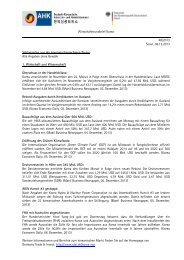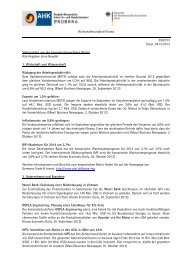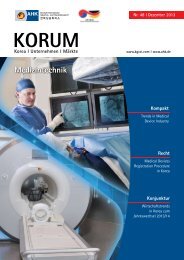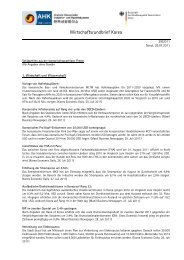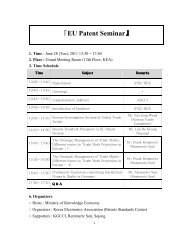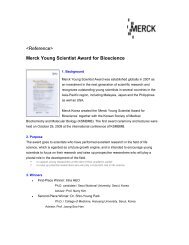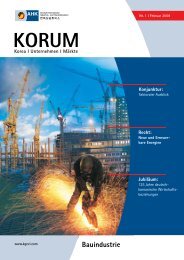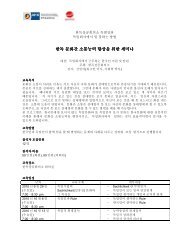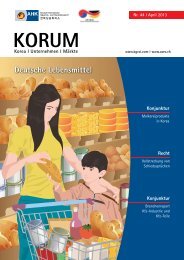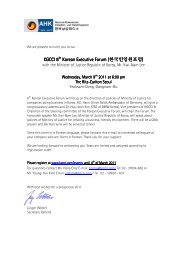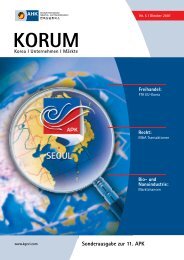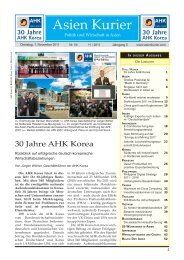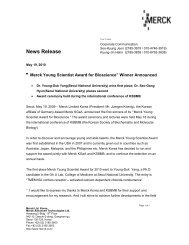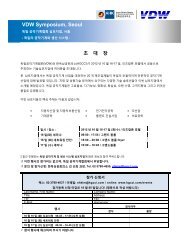korum - AHK Korea
korum - AHK Korea
korum - AHK Korea
- TAGS
- korum
- korea
- korea.ahk.de
Erfolgreiche ePaper selbst erstellen
Machen Sie aus Ihren PDF Publikationen ein blätterbares Flipbook mit unserer einzigartigen Google optimierten e-Paper Software.
KORUM www.kgcci.com<br />
<strong>Korea</strong> I Unternehmen I Märkte<br />
Investieren in Deutschland<br />
Nr. 36 I Dezember 2011<br />
I www.osec.ch<br />
Konjunktur<br />
Branchenreport<br />
Medizintechnik<br />
Recht<br />
Neuerungen<br />
Gesellschaftsrecht<br />
Kompetenz<br />
Rückblick Jubiläumsgala
Let us lead the way...we invite you to<br />
experience the Millennium Seoul Hilton<br />
Book the experience of a lifetime at millenniumseoulhilton.co.kr
Experience the New....<br />
Pioneering Spirit & Tradition<br />
Merck, the oldest chemical-pharmaceutical<br />
company in the world plays an important role<br />
in all our daily lives with many innovative products!<br />
You will find more information at:<br />
www.merck.co.kr
2011 - Meilenstein für die<br />
deutsch-koreanische Wirtschaft<br />
Schon jetzt zeichnet sich ab, dass das Jahr<br />
2011 ein Rekordjahr beim deutsch-korea-<br />
nischen Handel sein wird. Das Gesamtvolumen<br />
dürfte um über 15% auf 27-28<br />
Mrd. USD steigen. Dabei nimmt der deutsche<br />
Handelsbilanzüberschuss weiter zu,<br />
auch wegen des Freihandelsabkommens EU-<br />
<strong>Korea</strong>, das deutschen Lieferanten neue Möglichkeiten<br />
bietet.<br />
2011 brachte einen Durchbruch bei den<br />
deutschen Investitionen. Erstmals wurde im<br />
3. Quartal die Schwelle von 10 Mrd. USD<br />
akkumulierten deutschen Direktinvestitionen<br />
(Basisjahr 1962) überschritten. Deutschland<br />
ist der stärkste europäische industrielle<br />
Investor und deutsche Firmen leisten mit<br />
hervorragenden Produkten und ihren ca.<br />
100.000 lokalen Mitarbeitern einen signifikanten<br />
Beitrag zum Arbeitsplatzsicherung<br />
und bei der technologischen Weiterentwicklung<br />
der koreanischen Wirtschaft.<br />
2011 ist als Jubiläumsjahr ein wichtiger<br />
Meilenstein in der jetzt 30 Jahre umspannenden<br />
Geschichte der <strong>AHK</strong> <strong>Korea</strong>. Ich habe<br />
mich sehr über die durchweg positive Resonanz<br />
auf unser Gala Dinner am 9. November<br />
gefreut. Es war für alle Mitarbeiter der <strong>AHK</strong><br />
<strong>Korea</strong> ein bewegendes Ereignis, im Kreise<br />
von über 600 Mitgliedern und Gästen dieses<br />
Jubiläum zu begehen. In dieser KORUM Ausgabe<br />
finden Sie einige Impressionen. Auch<br />
an dieser Stelle geht noch einmal herzlicher<br />
Dank an alle Sponsoren, ohne die eine solche<br />
Veranstaltung nicht möglich gewesen wäre!<br />
Ich sehe sowohl die deutsche Wirtschaft in<br />
<strong>Korea</strong> auch die <strong>AHK</strong> <strong>Korea</strong> für die kommenden<br />
Jahre gut aufgestellt. Ich persönlich und<br />
das ganze Team der <strong>AHK</strong> <strong>Korea</strong> wünschen<br />
Ihnen einen erholsamen Jahreswechsel und<br />
viel Erfolg im kommenden Jahr 2012.<br />
Jürgen Wöhler<br />
Geschäftsführer<br />
Deutsch-<strong>Korea</strong>nische<br />
Industrie- und Handelskammer<br />
jwoehler@kgcci.com<br />
Kommentar<br />
It is already becoming apparent, that the<br />
year 2011 will be a record year for the<br />
German-<strong>Korea</strong>n trade. The total trade<br />
volume will most likely increase by more<br />
than 10% to 27-28 bill. USD, whereas the<br />
German trade surplus will continue to grow,<br />
due to the Free Trade Agreement EU-<strong>Korea</strong>,<br />
which offers new business opportunities to<br />
German suppliers.<br />
2011 was a breakthrough for German<br />
investments. The threshold of 10 bil. USD<br />
accumulated German direct investments<br />
(base year 1962) was broken through in the<br />
3 rd quarter for the first time. Germany is the<br />
strongest European industrial investor and<br />
German companies contribute significantly<br />
with excellent products and approximately<br />
100,000 local employees to job creation<br />
and the technological development of the<br />
<strong>Korea</strong>n economy.<br />
As an anniversary year, 2011 is also an<br />
important milestone for KGCCI, which<br />
has a history of 30 years now. I was very<br />
pleased with the overall positive resonance<br />
concerning our Gala Dinner on the 9 th of<br />
November. It was a moving experience<br />
for all KGCCI employees, to celebrate this<br />
anniversary together with over 600 members<br />
and guests. In this issue of KORUM you will<br />
find some impressions of that evening. Also I<br />
would like to thank all the sponsors, without<br />
whom the Gala Dinner would not have been<br />
possible. I see both the German economy<br />
and KGCCI well prepared for the upcoming<br />
years. I myself and the team of the KGCCI<br />
wish you a relaxing turn of the year and all<br />
the best for 2012.<br />
KORUM Nr. 36 | Dezember 2011 7
10<br />
Kompakt<br />
<strong>Korea</strong>n investments in Germany on the rise<br />
Germany: The most important investment location in the EU<br />
Leading high-tech sectors preferred<br />
Thomas Bozoyan<br />
In March 2011, the <strong>Korea</strong>n manufacturer Korloy,<br />
which specializes in the production of<br />
cutting tools, opened its European headquarters<br />
in Frankfurt am Main. Korloy counted on<br />
the support of Germany Trade & Invest, the<br />
foreign trade and inward investment promotion<br />
agency of the Federal Republic of<br />
Germany, and HA Hessen Agentur GmbH to<br />
establish its representation in Germany.<br />
“Germany is an exceptional business location<br />
for us to both accommodate our current<br />
customer base and provide us the opportunity<br />
to recruit new clients. Germany’s central<br />
location, excellent infrastructure, well-trained<br />
labor force, and innovative research and<br />
development permit us to strongly develop<br />
our business activities in Europe, states Jooho<br />
Kim, Managing Director of Korloy Europe<br />
GmbH.<br />
The special equipment of the Seoul-based<br />
firm is utilized in production processes for the<br />
automotive sector, mechanical engineering,<br />
electronics, and for the aviation industry. The<br />
Frankfurt office will serve as Korloy’s sales<br />
and distribution center in Europe.<br />
Germany’s outstanding reputation as business<br />
location for precision machinery and<br />
equipment played a decisive role in opening<br />
this office in Frankfurt. In Germany, Korloy<br />
not only benefits from high demand, but also<br />
KORUM Nr. 36 | Dezember 2011<br />
from a unique environment for research and<br />
development and potential for innovation.<br />
The computer game developer OnNet could<br />
also count on the guidance and support of<br />
Germany Trade & Invest to establish its representation<br />
Germany. In May 2010, it selected<br />
Berlin as its European headquarters. With<br />
over 21 million computer gamers and more<br />
than 62 million internet users, Germany is<br />
the largest and most attractive market in<br />
Europe. The fact that OnNet chose Berlin as<br />
its European headquarters reflects the appeal<br />
of the German market. The firm distributes<br />
and provides its gaming products and services<br />
in German, French and Spanish throughout<br />
Europe.<br />
David Chang, Managing Director of OnNet<br />
Europe GmbH reinforced this view by stating,<br />
“The ability for us to supply the computer<br />
game market locally serves as the foundation<br />
of our expansion into Europe. At the same<br />
time, Berlin is the optimal location for us<br />
to reach gamers on the whole continent. In<br />
addition, Germany has one of the world’s best<br />
communication infrastructures and a large<br />
pool of highly-qualified professionals.”<br />
When deciding on the ideal business location,<br />
Berlin’s advantages stood out: not only are<br />
approximately 3,000 ICT companies based<br />
there, but so is the entire supply chain, from<br />
programmers to publishers. Moreover, the<br />
access to an extensive network of organizations<br />
and educational institutions such as<br />
the Games Academy and the University of<br />
Applied Sciences in Berlin (HTW), serves to<br />
strengthen the labor markets with highlyqualified<br />
experts.<br />
The establishment of these representations<br />
in Berlin point to a clear trend in so-called<br />
“greenfield projects”. Two-thirds of <strong>Korea</strong>n<br />
firms invest in Germany primarily in leading<br />
high-tech sectors such as the machinery and<br />
the automotive industries (accounting for<br />
32% of projects), electronics and semiconductor<br />
industry (19%), or in the software and<br />
telecommunications sector (17%).<br />
The Financial Times database “fDi markets”<br />
registered a 47% increase in <strong>Korea</strong>n investment<br />
projects in Germany in the period between<br />
2003 and 2010. Among the preferred<br />
business locations in Germany are the federal<br />
states of Hessen, North Rhine-Westphalia<br />
and Bavaria.<br />
This promising trend is also confirmed by the<br />
German Central Bank. The impressive increase<br />
in Germany’s foreign direct investment position<br />
is remarkable. In 2000, the bank registered<br />
EUR 1.3 billion in investment, while statistics<br />
showed this figure rising to EUR 4.3 billion in<br />
<strong>Korea</strong>n “FDI-Stocks” in 2009.<br />
In order to put these figures into perspective,<br />
it is important to note that the second highest<br />
stock of foreign direct investment from<br />
Asia comes from <strong>Korea</strong>. In fact, <strong>Korea</strong> represents<br />
more foreign direct investment than the<br />
BRIC countries combined and lies ahead of<br />
industrialized nations like Canada and Ireland.<br />
Alongside “greenfield” investments, <strong>Korea</strong>n<br />
investors contribute to capital inflows<br />
and acquisitions. In 2010, approximately 125
<strong>Korea</strong>n companies were active in Germany.<br />
According to the “Markus Database” from<br />
the Bureau van Dijk Electronic Publishing,<br />
”<strong>Korea</strong>n firms employ over 4,700 people in<br />
Germany. Investments were allocated primarily<br />
to trade missions, other service providers<br />
and manufacturing.”<br />
As the foreign trade and inward investment<br />
promotion agency of the Federal Republic of<br />
FrankfurtRheinMain<br />
Germany, Germany Trade & Invest, advises<br />
foreign companies looking to expand their<br />
business activities in the German market.<br />
At the same time, it provides information<br />
on foreign trade to German companies that<br />
seek to enter foreign markets. Potential investors<br />
can obtain industry-specific information<br />
as well as tax and legal regulatory frameworks.<br />
Services encompass strategic planning,<br />
guidance on the selection of the ideal busi-<br />
<strong>Korea</strong>’s first choice for business in Europe<br />
Joern Siegle<br />
<strong>Korea</strong>n Garden in Frankfurt<br />
Whereas in the beginning of the history of<br />
<strong>Korea</strong>n companies in Germany other cities<br />
and regions also seemed to be preferred<br />
business locations, since the mid-1970s<br />
it became clear that Frankfurt and the<br />
Rhein-Main region would become the most<br />
favoured location for <strong>Korea</strong>n enterprises and<br />
institutions.<br />
The first major conglomerate was LG (at<br />
that time: Goldstar) which opened a subsidiary<br />
in Frankfurt in 1970 and is nowadays<br />
operating four divisions in Frankfurt. Also<br />
in 1970, the first <strong>Korea</strong>n bank opened a<br />
branch, soon followed by a number of affiliated<br />
companies of Samsung, Hyundai and<br />
Daewoo. Nowadays, almost all major <strong>Korea</strong>n<br />
companies have chosen FrankfurtRheinMain<br />
as their gateway to Europe making it the<br />
largest <strong>Korea</strong>n business community in Europe.<br />
Predominantly, they maintain sales corporations,<br />
administrative units, research &<br />
development facilities and technical centers<br />
here. Major industry sectors for them are<br />
electronics, IT, mechanical engineering, logistics<br />
and of course automotive. The <strong>Korea</strong>n<br />
carmakers entered the German market in<br />
the beginning of the 1990s. Hyundai and Kia<br />
continously expanded their sales volumes<br />
and invested considerably in R&D and design<br />
centers in the Rhein-Main-region where<br />
more and more car models are developed<br />
not only for the European but also for the<br />
world markets. These models are then being<br />
produced in their worldwide factories, for<br />
example in Slovakia or the Czech Republic.<br />
Recently also the number of components<br />
suppliers coming newly to or expanding<br />
their business in FrankfurtRheinMain is growing<br />
noticeably, examples are SK innovation,<br />
Kumho Tires and Nexen Tire, to name<br />
just three prominent ones.<br />
Part of the <strong>Korea</strong>n community are also many<br />
small and medium sized enterprises bringing<br />
the total number of companies to around<br />
200. In this regard, a business incubator for<br />
up to 15 <strong>Korea</strong>n SMEs is operated by the<br />
<strong>Korea</strong> Trade Promotion Corporation (KOTRA)<br />
in the outskirts of Frankfurt where SMEs<br />
can apply for an office and support. KOTRA<br />
maintains its European headquarters in<br />
downtown Frankfurt and has been present<br />
there for more than 40 years. On the official<br />
side, the community is completed by a<br />
Kompakt<br />
ness location, and concrete information on<br />
financing and incentive.<br />
We would be happy to assist you with the<br />
realization of your next investment project.<br />
Thomas Bozoyan is Senior Manager in the<br />
Market Intelligence Germany Department<br />
at Germany Trade & Invest in Berlin.<br />
Consulate General which is <strong>Korea</strong>’s largest<br />
in Europe.<br />
One of the reasons for choosing Frankfurt-<br />
RheinMain is its strategic location and<br />
excellent infrastructure in the middle of<br />
Europe being perfectly accessible by Frankfurt<br />
Airport, one of the Top 10 airports in<br />
the world. 35 million people can be reached<br />
within a 200 km radius. This fast and easy<br />
access matches perfectly with the <strong>Korea</strong>n<br />
culture of “bballi-bballi“ (quickly-quickly)<br />
aiming to act and move as quickly as possible<br />
and not to waste time on the ground<br />
or in the air. <strong>Korea</strong>n Air also recognized this<br />
potential and opened an office already in<br />
1974, its first direct flight between Frankfurt<br />
and Seoul took off in 1984, the same year as<br />
Lufthansa’s did. Currently there are 3 daily<br />
non-stop flights to Seoul-Incheon.<br />
Further advantages are the presence of the<br />
most important <strong>Korea</strong>n banks at the finan-<br />
Samsung Europe HQ<br />
KORUM Nr. 36 | Dezember 2011 11
ment and by increasing purchases from local<br />
suppliers. The FTA will also allow businesses<br />
such as Kia to invest more in the develop-<br />
ment of vehicles, technologies and services<br />
specifically for European consumers.<br />
Kompakt<br />
Europe is a very important market for Kia,<br />
and the company looks forward to this rejuvenated<br />
trade cooperation.<br />
Better understanding of European consumers<br />
Samsung European Research Center in Stuttgart<br />
Diana Diefenbach<br />
The Samsung European Research Center<br />
(ERC) has been located in Stuttgart, Germany<br />
since 2006. The province around Stuttgart,<br />
Baden-Wuerttemberg, is famous for<br />
its technology-driven industries. Not only<br />
many famous universities are located there<br />
but also renowned research institutes and<br />
employees offer a high level of engineering<br />
skills. Those were the main reasons why<br />
the ERC settled down in this area to benefit<br />
from the cooperation with external research<br />
institutes to increase its own resource pool.<br />
The ERC was established because Samsung<br />
Electronics saw the need to understand<br />
European customers better. When it comes<br />
to appliances, there are many differences<br />
between <strong>Korea</strong>n and European markets:<br />
while <strong>Korea</strong>ns prefer a large variety of colors<br />
and patterns because appliances (esp. refrigerators)<br />
are representative and placed near<br />
living room areas, Europeans primarily look<br />
for functions and comfort. For them, appliances<br />
are still “helpful” products supporting<br />
household chores.<br />
So the main objective of all projects is to fit<br />
Samsung products to consumer demands in<br />
Europe. The ERC also participates as member<br />
of several standardization boards and represents<br />
the interests of Samsung Electronics,<br />
such as establishing directive laws for the<br />
European Union and ISO Standards (Eco<br />
Design, Energy Label etc.). It is a member of<br />
the advisory board of the German Consumer<br />
Organization. The ERC also has strong ties<br />
with renowned research institutes and companies<br />
in the textile and detergent field to<br />
exchange knowledge.<br />
The ERC has all necessary laboratories to<br />
research, such as a Washing Machine Lab<br />
(see photo), Cooking Lab, Vacuum Cleaner<br />
Lab and Refrigerator Lab. There is also a<br />
new Safety Lab, in which all products are<br />
tested to guarantee maximum safety for the<br />
customers and also to strengthen their confidence<br />
in Samsung appliances. In addition,<br />
the ERC is Europe’s only Samsung R&D centre<br />
which is building a bridge between <strong>Korea</strong><br />
and Europe and thereby allows transnational<br />
product development. The <strong>Korea</strong>n counterpart<br />
of the ERC is the Samsung HQ Research<br />
& Development in Suwon.<br />
The ERC covers all of Europe and thus works<br />
as an interface between the European HQ<br />
(located in UK), European subsidiaries and<br />
product managers, marketing, sales, product<br />
planning and R&D. It acts as “translator”<br />
and intermediator between all departments<br />
involved and supports communication between<br />
engineering and marketing. For example,<br />
the ERC “translates” technical USPs<br />
(Unique Sales Propositions) into marketing<br />
language.<br />
Recently, washing machines with the socalled<br />
eco bubble technology were launched<br />
on the European market, which were developed<br />
with the ERC support concerning performance,<br />
handling and software design.<br />
The Eco Bubble machines wash clothes very<br />
gently and thoroughly by foaming the detergent<br />
prior to the wash cycle. It was optimized<br />
for the European customers’ needs<br />
and was sold successfully in a short time.<br />
This washing machine not only increased<br />
the image of Samsung as a home appliances’<br />
manufacturer in Europe but also the<br />
European Product Managers feel very attached<br />
to this product since they were directly<br />
involved in the development through the<br />
discussions in workshops.<br />
The European Research Center will continue<br />
to act as an intermediator in order to customize<br />
Samsung’s home appliances to European<br />
customers´ needs.<br />
Diana Diefenbach is Senior Engineer ERC<br />
at Samsung Electronics Deutschland.<br />
KORUM Nr. 36 | Dezember 2011 13
14<br />
Kompakt<br />
„Successful partnerships through local networks“<br />
Interview with Dieter Geppert<br />
Dr.-Ing. Dieter Geppert, Managing Director LG Technology<br />
Center Europe<br />
Dr. Geppert, the LG Technology Center<br />
Europe is one of just three LG Technology<br />
Centers (TC) outside of <strong>Korea</strong>. Why has<br />
LG set up this Center?<br />
Geppert: Well, of course the LG Group operates<br />
much more than just three overseas<br />
R&D Labs. However, these R&D Labs are all<br />
assigned to one of the about 60 individual<br />
companies which belong to the LG Group.<br />
In contrast, the three Overseas Technology<br />
Centers work on a corporate level. This<br />
means that we support all major LG companies<br />
at the same time. The LG Technology<br />
Center Europe (LGTCE) was established<br />
in 1998 during the IMF crisis in <strong>Korea</strong>. LG<br />
recognized that it is mandatory for a global<br />
company not only to rely on domestic<br />
R&D resources but also to cooperate with<br />
leading overseas R&D institutions. Europe<br />
and especially Germany have a high density<br />
of advanced technologies. If you want to<br />
establish successful collaborations, then you<br />
must be close to your partners and set up a<br />
local network.<br />
In what main business areas are you looking<br />
for cooperation partners?<br />
Geppert: As I mentioned before, LGTCE<br />
KORUM Nr. 36 | Dezember 2011<br />
works across the whole LG Group which has<br />
major business domains in electronics and<br />
chemistry, covering a very wide range of<br />
different products and technologies. Some<br />
examples of our competences are mobile<br />
and wireless communication, 3D technologies,<br />
display materials, plastic processing,<br />
electric vehicles, smart grids, photovoltaics<br />
or Li-polymer batteries. In many of these<br />
areas we can find front-end technologies<br />
and cooperation partners in Germany and<br />
other European countries.<br />
What LG product has e.g. been developed<br />
with partners from Germany that you<br />
identified?<br />
Geppert: We are not that much focusing<br />
on the development of completely new products<br />
but more on technologies which can<br />
improve the properties of products or add<br />
new features. For instance, currently we<br />
are evaluating various functional coatings<br />
to improve the scratch resistance of plastic<br />
surfaces or to increase the efficiency of<br />
solar modules. With a German university we<br />
have a long-term cooperation for the joint<br />
development of an advanced semiconductor<br />
material. In another project with a medium<br />
sized German company we developed a new<br />
wireless system of electronic displays for<br />
price and product information on the shelves<br />
of supermarkets and other shops. We are<br />
now testing the first pilot installations.<br />
How is the cooperation process managed?<br />
Geppert: The process in most of the projects<br />
is quite similar. It starts with a request from<br />
<strong>Korea</strong> or an idea from our side. Then we are<br />
searching and evaluating cooperation partners,<br />
sign non-disclosure agreements and<br />
exchange technical data and samples. The<br />
most difficult part usually is to match the<br />
technical requirements, the schedule and<br />
especially to find the right business model<br />
for a win-win partnership. Fairness, confidentiality<br />
and LG’s “Jeong-do Management”<br />
are important aspects for us. An essential<br />
part of our job is also to bridge the cultural<br />
differences between <strong>Korea</strong> and Europe. We<br />
have to explain our <strong>Korea</strong>n partners why<br />
things are moving slowly in Europe and to<br />
our European partners why <strong>Korea</strong> always<br />
expects it “bballi bballi”.<br />
What were the reasons for LG to set up<br />
the center in Düsseldorf-Neuss?<br />
Geppert: When LGTCE was established,<br />
several other locations where under consideration.<br />
The decision was finally made<br />
for Aachen, which has one of the leading<br />
technical universities in Germany (RWTH).<br />
It is also quite well-known in <strong>Korea</strong> and is<br />
located in the center of a high-tech cluster.<br />
LG cooperates with European partners for the development of<br />
advanced 3D displays<br />
However, we soon realized that there are<br />
many other very interesting technology regions<br />
in Germany and Europe and it became<br />
more important to have excellent traffic<br />
connections. For this reason we moved our<br />
office to Düsseldorf-Neuss. This city has an<br />
international airport, high-speed train connections<br />
and an excellent infrastructure for<br />
<strong>Korea</strong>n companies and employees.<br />
Interview: Carsten Lienemann, KGCCI<br />
Deputy Secretary General.
16<br />
Konjunktur<br />
Markt für Medizintechnik in <strong>Korea</strong><br />
Der scharfe Wettbewerb der hauptsächlich<br />
privaten koreanischen Krankenhäuser fördert<br />
die Anhebung des medizintechnischen<br />
Niveaus im Land. Führende Kliniken bieten<br />
beispielsweise in bestens ausgestatteten<br />
medizinischen Zentren die stark nachgefragten<br />
Vorsorgeuntersuchungen an, die<br />
über die kostenlosen, aber sehr einfachen<br />
Basisuntersuchung der Nationalen Krankenversicherung<br />
(NHI) hinausgehen.<br />
Auch in Zukunft wird der Bedarf an technologisch<br />
anspruchsvollen Ausrüstungen<br />
und Geräten in <strong>Korea</strong> hoch sein. Mit dem<br />
steigenden Wohlstand und der rapiden Alterung<br />
der Bevölkerung wachsen auch die<br />
Ansprüche der <strong>Korea</strong>ner an die medizinische<br />
Versorgung. Dem wird durch den Bau neuer<br />
Krankenhäuser und die Erweiterung bestehender<br />
medizinischer Zentren Rechnung<br />
getragen.<br />
Einfluss auf den Gesundheitsmarkt hat auch<br />
die Politik der NHI, in die fast alle <strong>Korea</strong>ner<br />
einzahlen. So wurde die Eigenbeteiligung<br />
von Patienten bei der Behandlung von<br />
Krebs und anderen schweren Krankheiten<br />
2009 auf 5% beziehungsweise 10% halbiert.<br />
Andererseits steht auch die NHI unter<br />
Spar- und Finanzierungsdruck. Die <strong>Korea</strong>ner<br />
tragen einen hohen Anteil der Kosten für<br />
ihre Gesundheit selbst (2010: 32%). Insgesamt<br />
lag der Anteil der Gesundheitsausgaben<br />
am Bruttoinlandsprodukt in <strong>Korea</strong><br />
2010 bei 7,0%. Dies war der drittniedrigste<br />
Wert unter den OECD-Mitgliedern. Deutschland<br />
zum Beispiel gab 11,6% (2009) für die<br />
Gesundheit aus.<br />
Die Regierung versucht, den Gesundheitstourismus<br />
zu fördern und führte dazu 2009<br />
spezielle Visa ein. Zu den Zielgruppen zäh-<br />
KORUM Nr. 36 | Dezember 2011<br />
Veränderung in %<br />
2008 2009 2010 Veränderung<br />
2010/093<br />
Lokale Produktion (in Mrd. Won) 2.525 2.764 2.964 7,2<br />
Lokale Produktion (in Mio. USD) 1 2.285 2.166 2.564 18,4<br />
Import (in Mio. USD) 2.123 1.879 2.266 20,6<br />
Export (in Mio. USD) 1.132 1.190 1.682 22,2<br />
Marktvolumen (in Mio. USD) 2 3.276 2.855 3.376 9,9<br />
Marktvolumen (in Mrd. Won) 2 3.620 3.643 3.903 7,1<br />
Quellen: <strong>Korea</strong> Food & Drug Administration (KFDA), Berechnungen von Germany Trade & Invest<br />
1 umgerechnet zum durchschnittlichen Wechselkurs 1 USD = 1.105 Won (2008), 1.276 (2009), 1.156 (2010)<br />
2 rechnerisch: lokale Produktion + Import - Export<br />
len unter anderem Patienten aus den USA,<br />
China, Japan und Russland. Die Zahl ausländischer<br />
Gesundheitstouristen in <strong>Korea</strong><br />
erreichte 2010 knapp 82.000 Personen. Dies<br />
war ein Zuwachs um 36% gegenüber dem<br />
Vorjahr, bleibt aber im internationalen Vergleich<br />
wenig.<br />
Produktion/Branchenstruktur<br />
Laut der <strong>Korea</strong> Medical Devices Industry<br />
Association (KMDIA) gab es 2009 etwa<br />
1.750 inländische Hersteller von medizinischen<br />
Geräten und Ausrüstungen. Sehr<br />
kleine Unternehmen bestimmen das Bild der<br />
Branche. Mehr als 82% der Hersteller hatten<br />
2009 weniger als 20 Beschäftigte, stellten<br />
aber nur 23,6% des Produktionswertes. Die<br />
Top 20 standen 2010 für 37% der gesamten<br />
Outputs.<br />
Marktführer Medison firmiert seit dem Einstieg<br />
von Samsung Electronics bei der Firma<br />
im Jahre 2011 unter dem Namen Samsung<br />
Einfuhr ausgewählter medizintechnischer Produkte nach <strong>Korea</strong><br />
Medison. Der Ultraschallgerätehersteller<br />
produzierte 2010 Ausrüstungen im Wert<br />
von 232,5 Mrd. Won. Von 2010 bis 2020 will<br />
die Samsung Group 1,2 Bill. Won im Bereich<br />
Medizintechnik investieren. Auch Siemens<br />
und General Electric fertigen in Südkorea<br />
Ultraschallgeräte.<br />
2010 stieg die lokale Produktion um 7,2%<br />
auf rund 2,96 Bill. Won. Die wichtigsten<br />
Erzeugnisse waren bildgebende Systeme<br />
mit Ultraschall, Edelmetalllegierungen für<br />
Dentalanwendungen, Dentalimplantate und<br />
Brillengläser. Insgesamt stellt Südkorea vor<br />
allem einfachere medizinische Geräte her.<br />
2009 entfielen laut <strong>Korea</strong> Health Industry<br />
Development Institute (KHIDI) 64,6% des<br />
Branchenproduktionswerts auf Erzeugnisse<br />
mit einem relativ geringen Risikograd. Hingegen<br />
kamen die technologisch anspruchsvollsten<br />
Geräte auf 85,8 Mrd. Won oder<br />
3,1% der Gesamterzeugung.<br />
Um das Niveau der lokalen Industrie anzuheben,<br />
beschloss die Regierung 2009 den<br />
Bau von zwei Komplexen für medizinische<br />
Spitzentechnologien in Daegu und in Osong<br />
(Provinz North Chungcheong). Dort sollen<br />
Arzneimittel und medizinische Geräte auf<br />
dem neuesten Stand der Technik entwickelt<br />
werden. Geplant sind inklusive Betriebskosten<br />
und Forschungsausgaben Aufwendungen<br />
in Höhe von 5,6 Bill. Won in Daegu<br />
und 4,3 Bill. Won in Osong im Zeitraum von<br />
2009 bis 2038, wobei die Kerninfrastruktur<br />
in: Mio. USD<br />
SITC-Pos. Warenbenennung 2009 2010<br />
davon aus<br />
Deutschland<br />
(2009)<br />
774.1 Elektrodiagnoseapparate und -geräte 205,0 283,6 35,7<br />
774.2 Röntgenapparate etc. 380,0 513,7 124,3<br />
741.83 Sterilisierapparate 10,1 14,9 0,2<br />
785.31 Rollstühle 9,9 10,8 1,5<br />
872.1 Zahnmedizinische Instrumente; a.n.g. 42,6 49,4 9,9<br />
872.21 Spritzen, Nadeln, Katheter, Kanülen etc. 198,2 240,4 7,0<br />
872.25 Ophthalmologische Instrumente 48,2 72,5 31,0<br />
872.29 Andere Instrumente, Apparate und Geräte 518,3 594,8 102,9<br />
872.3 Therapiegeräte, Atmungsgeräte etc. 81,5 112,9 3,7<br />
872.4 Medizinmöbel 12,9 12,7 1,8<br />
899.6 Orthopädietechnik, Prothesen etc. 428,2 483,0 35,5<br />
Insgesamt 1.934,7 2.388,3 353,4<br />
Quelle: <strong>Korea</strong>nische Zollstatistik, Kotis
is 2012 entstehen soll. In der Medizintechnik<br />
liegt der Schwerpunkt in Daegu auf ITbasierten<br />
Geräten und in Osong auf Geräten<br />
für die Biotechnologie.<br />
Außenhandel<br />
<strong>Korea</strong> führte 2010 Medizintechnik für 2,39<br />
Mrd. USD ein. Gegenüber dem Vorjahr war<br />
das ein Anstieg um 23,4%. Im 1. Halbjahr<br />
2011 wuchsen die Einfuhren um 17,7% auf<br />
1,34 Mrd. USD.<br />
Wichtigste Lieferländer sind die USA,<br />
Deutschland, Japan und China. Besonders<br />
gefragte Branchenprodukte "Made in Germany"<br />
waren 2010 unter anderem CT (32,8<br />
Ausgewählte Krankenhausprojekte<br />
Vorhaben<br />
Krankenhaus, Songdo<br />
(Incheon)<br />
Krankenhaus,<br />
Changwon (Prov. South<br />
Gyeongsang)<br />
Krankenhaus, Songak-<br />
Distrikt der Yellow Sea<br />
Free Economic Zone<br />
(Prov. S. Chungcheong)<br />
Investitionssumme<br />
390<br />
382,5<br />
Yonsei Cancer Center 250<br />
Umbau Krankenhaus,<br />
Busan<br />
Krebszentrum,<br />
Gehirnnerv-Zentrum u.<br />
Gesundeitszentrum<br />
Yongin Dongbaek<br />
Severance Hospital,<br />
Yongin (Prov. Gyeonggi)<br />
Dongtan Sacred Heart<br />
Hospital, Hwaseong<br />
(Prov. Gyeonggi)<br />
Krankenhaus,<br />
Eunpyong New Town,<br />
Seoul<br />
Centum Hospital<br />
(vorläufiger Name),<br />
Stadt Jeju<br />
300 Plan<br />
Mio. USD), ophtalmologische Instrumente<br />
(31,0 Mio. USD), MRI (28,8 Mio. USD), Dialysatoren<br />
für die Hämodialyse (27,9 Mio.<br />
USD), Hämodialysesysteme (14,0 Mio. USD),<br />
Angiographiegeräte (11,9 Mio. USD) und<br />
künstliche Gelenke (9,1 Mio. USD).<br />
Geschäftspraxis<br />
Der Einstieg in den koreanischen Markt<br />
gelingt in der Regel am besten über einheimische<br />
Importeure. Gute persönliche<br />
Beziehungen zu den Entscheidungsträgern,<br />
also in erster Linie zu den Ärzten, sind eine<br />
Grundvoraussetzung für den geschäftlichen<br />
Erfolg. Andere wichtige Kriterien sind eine<br />
hohe Produktqualität, ein guter After-Sales-<br />
Projektstand Anmerkungen/Auftraggeber<br />
Plan, Bau von Ende<br />
2011 bis 2015<br />
Im Mai 2011 von<br />
Stadt genehmigt;<br />
Fertigstellung Ende<br />
2015<br />
Bau von Juli 2010 bis<br />
2013<br />
218 Plan bis 2017<br />
95<br />
k.A.<br />
k.A.<br />
k.A.<br />
71<br />
Bau von Februar 2010<br />
bis Mai 2012<br />
Plan, Fertigstellung<br />
Dezember 2014<br />
Bau von Mai 2010 bis<br />
2012<br />
Plan, Bau von März<br />
2012 bis Dezember<br />
2014<br />
Bau von August 2011<br />
bis März 2013<br />
1.000 Betten (davon 300 für<br />
Ausländer) / Yonsei University<br />
Health System<br />
zunächst 700, später 1.200 Betten<br />
/ Gyeongsang National University<br />
Hospital<br />
500 Betten / Chungnam National<br />
University<br />
476 Betten / Yonsei University<br />
Health System<br />
u.a. Zentren f. äußere Krankheiten<br />
u. f. Atmungsorgange (2013) /<br />
Pusan Nat. University Hospital<br />
1.300 Betten / Bundang Seoul<br />
National University Hospital<br />
1.000 Betten / Yonsei University<br />
Health System<br />
850 Betten / Hallym University<br />
Medical Center<br />
500 Betten / Stadt Seoul<br />
330 Betten / Jeju Jung Ang<br />
Hospital<br />
in: Mrd. Won<br />
Quelle: Recherchen von Germany Trade & Invest<br />
Konjunktur<br />
Service und wettbewerbsfähige Preise.<br />
Grundlage für die Zulassung von medizinischen<br />
Instrumenten und Geräten ist der<br />
"Medical Device Act". Das Genehmigungsverfahren<br />
bei der zuständigen Behörde KFDA<br />
gilt als recht aufwändig (siehe: www.mpomag.com/articles/2007/05/medical-deviceregistration-in-korea-an-overview).<br />
Um für<br />
Produkte der Risikoklasse zwei und höher<br />
eine Lizenz zu erhalten, muss eine umfangreiche<br />
technische Dokumentation bis hin zu<br />
Ergebnissen klinischer Versuche eingereicht<br />
werden, außerdem ein Produkttest und ein<br />
GMP-Konformitätsnachweis (GMP - good<br />
manufacturing practices). Bis zur Produktzulassung<br />
sind mindestens drei Monate zu<br />
veranschlagen.<br />
Importe von Medizintechnik nach <strong>Korea</strong><br />
wurden bis Juni 2011 mit einem Zoll von bis<br />
zu 8% vom cif-Wert belegt. Hinzu kommt<br />
die Mehrwertsteuer von 10%. Dank des Freihandelsabkommens<br />
zwischen der EU und<br />
<strong>Korea</strong> sind seit Juli 2011 für weitere Waren<br />
die Zölle entfallen. Innerhalb von sieben<br />
Jahren sollen sie vollständig abgebaut werden.<br />
Für die wichtigsten aus Deutschland<br />
importierten medizinischen Geräte erfolgt<br />
dies stufenweise in einem Zeitraum von drei<br />
bis fünf Jahren.<br />
Wichtigste heimische Messe für Medizintechnik<br />
ist die jährlich stattfindende <strong>Korea</strong><br />
International Medical & Hospital Equipment<br />
Show (KIMES). Sie findet das nächste Mal<br />
vom 16.02. bis 19.02.2012 in Seoul statt.<br />
Frank Robaschik ist Korrespondent von<br />
Germany Trade & Invest in <strong>Korea</strong>.<br />
KORUM Nr. 36 | Dezember 2011 17
18<br />
Kompetenz<br />
KGCCI 30 th Anniversary Gala Dinner<br />
Opening address by KGCCI Chairman Cho Haehyeong,<br />
Chairman & CEO Nara Holdings<br />
Welcome by KGCCI President Friedrich<br />
Stockinger, President TRUMPF <strong>Korea</strong><br />
The lucky draw first price, a BMW bicycle,<br />
went to Mr. Hendrik Neuhaus<br />
A special thanks goes to all sponsoring companies and VIP<br />
attending.<br />
The KGCCI team<br />
KORUM Nr. 36 | Dezember 2011<br />
The festive KGCCI 30 Year Anniversary Gala was opened with a ceremony that combined<br />
traditional <strong>Korea</strong>n elements with an artistic life painting performance.<br />
KGCCI founding member companies received a plaque of<br />
appreciation.<br />
More than 600 KGCCI Members and friends attended the Gala<br />
Dinner at Grand Hyatt Hotel, Seoul.<br />
Despite the US-<strong>Korea</strong> FTA ratification process,<br />
Trade Minister Kim Jong-hoon addressed the<br />
Gala Dinner.<br />
Keynote speaker Matthis Machnig, Minister<br />
of Economy, Labor and Technology at the Free<br />
State of Thuringia<br />
KGCCI Secretary General Juergen Woehler<br />
guides through the evening.<br />
Musical performances by CEO Band<br />
Celebratory aria by Michael Suh,<br />
Lee & Ko Law Office<br />
Musical performances by Seoul Brass Band
Photo Wall<br />
Kompetenz<br />
Thank you to our partners for supporting the KGCCI 30 th Anniversary Gala Dinner<br />
Platinum Sponsors<br />
Gold Sponsors<br />
Silver Sponsors<br />
KORUM Nr. 36 | Dezember 2011 19
20<br />
Kontrakte<br />
Reform des Gesellschaftsrechts<br />
Neue Rechtsformen und Beteiligungsmöglichkeiten<br />
Moritz Winkler, Hyung-Chul Moon<br />
On 11 March 2011, the <strong>Korea</strong>n National Assembly passed a long-awaited bill to amend<br />
the Corporation Chapter of the <strong>Korea</strong>n Commercial Code. The amendments are both<br />
significant and far-ranging. Among other changes, they introduce new corporate<br />
forms, expand shareholding options, prohibit misappropriation of corporate opportunities<br />
and reduce restrictions on dividend distribution. The bill will take effect on 15<br />
April 2012.<br />
Am 11. März 2011 verabschiedete die koreanische<br />
Nationalversammlung die langerwartete<br />
Reform des im koreanischen Handelsgesetzbuch<br />
(KCC) verankerten Gesellschaftsrechts.<br />
Die weitreichenden Änderungen<br />
treten am 15. April 2012 in Kraft und<br />
beinhalten u.a. eine neue Gesellschaftsform,<br />
erweiterte Beteiligungsmöglichkeiten an<br />
Gesellschaften, das Verbot der Vereitelung<br />
von Geschäftschancen der Gesellschaft und<br />
eine vereinfachte Dividendenausschüttung.<br />
Limited Liability Company<br />
Die im KCC bisher festgeschriebenen vier<br />
Gesellschaftsformen werden um die Limited<br />
Liability Company (yuhan-chaegim-hoesa)<br />
erweitert. Diese ist stark an die U.S.-amerikanische<br />
L.L.C. angelehnt.<br />
Die bestehenden Gesellschaftsformen chusik-hoesa<br />
(ähnelt der deutschen AG) sowie<br />
yuhan-hoesa (ähnelt der deutschen GmbH),<br />
bieten Investoren bereits die Möglichkeit der<br />
Haftungsbegrenzung auf das Stammkapital<br />
der Gesellschaft. Die yuhan-chaegim-hoesa<br />
ist jedoch einfacher zu gründen und hat<br />
geringere Anforderungen an die Corporate<br />
Governance. Insbesondere Private Equity<br />
Fonds und Venture Capitalists sollen sich<br />
dieser Gesellschaftsformen bedienen können.<br />
Mit dem Wegfall der Obergrenze von bisher<br />
50 Gesellschaftern sowie der Mindestkapitalisierung<br />
von 10 Millionen KRW wird auch<br />
die Gründung der yuhan-hoesa attraktiver.<br />
Weiterhin sind aber wie bei der chusik-hoesa<br />
mindestens 100 Millionen KRW Kapital not-<br />
KORUM Nr. 36 | Dezember 2011<br />
wendig, um als Foreign Invested Company<br />
qualifiziert zu werden, womit u.a. Devisengenehmigungen<br />
für Dividendentransfer und<br />
Kapitalrepatriierung verbunden sind.<br />
Ausschluss von Minderheitsaktionären<br />
Nach der Reform können nun Minderheitsaktionäre<br />
auf Beschluss der Gesellschafterversammlung<br />
durch einen Mehrheitsaktionär,<br />
der mindestens 95% des Grundkapitals<br />
des Unternehmens hält, zum Verkauf<br />
ihrer Aktien zu einem angemessenen Preis<br />
gezwungen werden (sog. Squeeze-Out).<br />
Sofern sich die Parteien nicht über den Preis<br />
für die Aktien einigen können, wird er durch<br />
das Gericht bestimmt.<br />
Erleichterte Dividendenausschüttung<br />
Statt der Gesellschafterversammlung kann<br />
der Verwaltungsrat (Board of Directors) eines<br />
Unternehmens künftig den Jahresabschluss<br />
genehmigen und die jährliche Dividendenausschüttung<br />
als Bar- oder Sachdividende<br />
bestimmen. Lediglich für die sog. Stockdividende<br />
ist weiterhin ein Beschluss der Gesell-<br />
schafterversammlung notwendig.<br />
Flexiblere Gestaltung von Rücklagen<br />
Nach der neuen Rechtslage ist nun möglich,<br />
dass Unternehmen Dividenden aus einer<br />
bestehenden Rückstellung, die 150% des<br />
Stammkapitals überschreitet, auf Beschluss<br />
der Gesellschafterversammlung ausschütten<br />
können.<br />
Stimmrechtlose Stammaktien und andere<br />
Aktienformen<br />
Zukünftig kann eine Gesellschaft besondere<br />
Arten von Aktien herausgeben, wie etwa<br />
stimmrechtlose Stammaktien oder Aktien<br />
mit bedingten Stimmrechten. Allerdings dürfen<br />
diese besonderen Aktiengattungen nicht<br />
mehr als 1/4 aller ausgegebenen und sich im<br />
Umlauf befindlichen Aktien ausmachen. Bis<br />
dato waren nur stimmrechtlose Vorzugsaktien<br />
zugelassen.<br />
Ausgabe von Unternehmensanleihen<br />
Mit der Reform werden bestimmte Einschränkungen<br />
bei der Ausgabe von Unternehmensanleihen<br />
beseitigt. So darf der<br />
Gesamtwert aller emittierten Anleihen<br />
zukünftig mehr als 1/4 des Eigenkapitals des<br />
Unternehmens ausmachen. Ferner dürfen<br />
bestimmte Arten von Anleihen auch von<br />
nicht börsennotierten Unternehmen herausgegeben<br />
werden. Dazu zählen etwa sog.<br />
Umtauschanleihen (gewähren dem Anleger<br />
das Recht, diese in Aktien eines anderen<br />
Unternehmens umzutauschen, welche der<br />
Emittent in seinem Bestand hat) sowie Dividendenanleihen<br />
(gewähren dem Emittenten<br />
das Recht, ihn an der Dividendenausschüttung<br />
zu beteiligen).<br />
Elektronische Aktienzertifikate<br />
Nach der bisherigen Rechtslage war eine
Verbriefung der Mitgliedschaft in Form von<br />
Aktienurkunden oder Urkunden über Anleihen<br />
notwendig. Nach der neuen Rechtslage<br />
ist es nunmehr möglich, Aktien und Anleihen<br />
elektronisch zu registrieren und Anteile ohne<br />
Übergabe eines verbrieften Inhaberpapiers<br />
zu übertragen.<br />
Verbot von Nebengeschäften<br />
Mit der Reform wird die aus dem angelsächsischen<br />
Recht stammende Geschäftsschancenlehre<br />
gesetzlich verankert. Danach darf<br />
ein Geschäftsführer die Gelegenheit zum<br />
Abschluss eines aktuellen oder zukünftigen<br />
Geschäfts, das der Gesellschaft zusteht, als<br />
Privatperson oder im Namen Dritter nur<br />
wahrnehmen, sofern dies von einer 2/3<br />
Mehrheit des Verwaltungsrats gebilligt wird.<br />
Beschränkung der Haftung von Direktoren<br />
Zukünftig kann die Gesellschaft die Haftung<br />
ihrer Direktoren auf das 6-fache von<br />
deren Jahresvergütung beschränken (nur<br />
3-facher Betrag im Fall von sog. Direktoren<br />
ohne besonderen Aufgabenbereich). Die<br />
Haftungsbeschränkung muss in der Satzung<br />
der Gesellschaft festgeschrieben werden,<br />
ist aber nicht anwendbar, sofern die Gesellschaft<br />
aufgrund vorsätzlichen oder grob<br />
fahrlässigen Verhaltens des Direktors einen<br />
Schaden erlitten hat. Die persönliche Haftung<br />
der Direktoren im Verhältnis zu Dritten<br />
kann weiterhin nicht beschränkt werden.<br />
Vor der Gesetzesänderung konnte die persönliche<br />
Haftung eines Direktors nur durch<br />
einstimmigen Beschluss der Gesellschafterversammlung<br />
von der Gesellschaft übernommen<br />
werden. Mit der neuen Regelung<br />
erhofft man sich, dass Unternehmen mehr<br />
talentierte Führungskräfte anwerben können<br />
und Geschäftsführer unternehmerischer und<br />
nicht nur risikovermeidend agieren.<br />
Executive Officers<br />
Obwohl die meisten koreanischen Unternehmen<br />
de facto von sog. Executive Officers<br />
(leitende Angestellte ohne Organstellung)<br />
verwaltet werden, war der rechtliche Status<br />
dieser Personen bisher nicht im KCC<br />
Kontrakte<br />
definiert. Nach der neuen Rechtslage können<br />
Executive Officers mit Zustimmung<br />
des Verwaltungsrats benannt werden. Die<br />
Bestellung eines Representative Directors,<br />
der bisher allein die Gesellschaft nach außen<br />
vertreten durfte, ist dann nicht mehr zwingend<br />
notwendig.<br />
Compliance Officer<br />
Nach der Neufassung des KCC müssen<br />
bestimmte börsennotierte Unternehmen<br />
(welche darunterfallen, bedarf noch der<br />
Bestimmung durch Präsidialdekret) mindestens<br />
einen auf Vollzeitbasis beschäftigten<br />
Compliance Officer bestellen sowie Compliance-Kontrollmechanismen<br />
einführen. Bis<br />
dato mussten nur Banken und andere Finanzinstitute<br />
über einen Compliance Officer<br />
verfügen. Personen mit Anwaltszulassung<br />
oder ausreichenden Rechtskenntnissen sind<br />
dafür qualifiziert.<br />
Moritz Winkler ist deutscher Rechtsanwalt,<br />
Hyung-Chul Moon ist koreanischer<br />
Rechtsanwalt bei Yulchon in Seoul.<br />
Making our world safer<br />
TÜV Nord Group<br />
represented in <strong>Korea</strong> by its two<br />
companies TUV Nord <strong>Korea</strong> and INCOK.<br />
With more than 200 highly qualified employees, we<br />
provide expert services in inspection, testing and certification for<br />
domestic and international clients.<br />
The Inspection Company of <strong>Korea</strong><br />
Member of TÜV NORD Group<br />
836-15, Yeoksam-dong, Gangnam-gu, Seoul <strong>Korea</strong><br />
Tel.:+82-2-2188-0011, Fax:+82-2-554-3884<br />
www.incok.co.kr seoul@incok.com<br />
TÜV NORD <strong>Korea</strong> Ltd.<br />
Member of TÜV NORD Group<br />
#1702 <strong>Korea</strong> Trade Tower, 159-1<br />
Samseong-dong, Gangnam-gu, Seoul 135-729 , <strong>Korea</strong><br />
Tel. +82-2-6000-4222, Fax. +82-2-6000-4223<br />
i@tuv-nord.com www.tuvnord.or.kr<br />
KORUM Nr. 36 | Dezember 2011 21
22<br />
Schweizer Seiten<br />
Plattform „Medtech Switzerland“<br />
Eine Perle des Schweizer Exporthandels<br />
Isabelle Leemann<br />
The Swiss Medtech-industry is regarded as one of the main exportindustries, with an<br />
export share of 5% on the total Swiss exports. Just like "Cleantech Switzerland" and<br />
ingenious Switzerland (see KORUM August edition), the export platform<br />
“Medtech Switzerland” provides assistance and services to Swiss Medtech<br />
firms, in order to help entering Medtech markets abroad, thereby increase<br />
the export rate and promote Swiss quality abroad.<br />
Es gibt kaum ein anderes Land in Europa,<br />
das so viele Unternehmen im Bereich Medizintechnologie<br />
(Medtech) aufweist, wie die<br />
Schweiz, wo rund 1.400 Unternehmen in<br />
dieser Branche tätig sind. Neben globalen<br />
Großunternehmen wie Roche Diagnostics,<br />
Straumann oder Synthes sind die meisten<br />
davon KMU. Mehr als 10.000 verschiedene<br />
Produkte im Bereich Orthopädie, Traumatologie,<br />
Zahnmedizin etc. werden in der<br />
Schweiz hergestellt. Die Schweizer Medtech<br />
deckt die gesamte Wertschöpfungskette, von<br />
R&D bis hin zu Entwicklung, Herstellung und<br />
Produktvertrieb ab.<br />
Exporte in der Medtech-Industrie sind ab<br />
Mitte der 90er Jahr rasant angestiegen.<br />
Mittlerweile werden rund 90% des jährlichen<br />
Umsatzes aller Medtech Unternehmen<br />
über Ausfuhren generiert (22,9 Mrd. CHF im<br />
Jahr 2008). Im Jahr 2008 verzeichnete die<br />
Branche einen Warenexportwert von 9,6<br />
Mrd. CHF; das entspricht 5% der gesamten<br />
Warenexporte der Schweiz und macht<br />
Medtech zu einer der wichtigsten Exportbrachen<br />
für die Schweizer Wirtschaft (FASMED<br />
2010). Dabei sind die wichtigsten Absatzländer<br />
für Medtech-Produkte Deutschland<br />
und die USA, weitere Medtech-Zielmärkte<br />
sind China und Japan. Um den vielzähligen<br />
Medtech Unternehmen den Export in ausländische<br />
Märkte zu erleichtern, schuf die<br />
Osec (www.osec.ch) auf Anweisung der<br />
Schweizer Regierung im Zuge der Stabilisierungsmaßnahmen<br />
(Finanzkrise 2008/09) die<br />
Exportplattform Medtech Switzerland.<br />
Genau wie die anderen Exportplattformen<br />
hat auch die Organisation „Medtech Swit-<br />
KORUM Nr. 36 | Dezember 2011<br />
zerland“ die Aufgabe, exportorientierten<br />
Schweizer KMU-beim Einstieg in ausländische<br />
Medtech-Märkte, der oft durch politisch<br />
beeinflusste Marktbarrieren und strikte<br />
Regulationen erschwert wird, in allen Belangen<br />
zu assistieren. Zusätzlich fördert die<br />
Exportplattform Medtech im Ausland einen<br />
Sektor der Schweizer Wirtschaft, der durch<br />
klinische Studien und Engineering, sowie<br />
hochstehende wissenschaftliche Leistungen,<br />
Entwicklung von Instrumenten für Leberoperationen im<br />
Inselspital Universitätsspital Bern<br />
Quelle: CAScination AG und www.medtech-switzerland.com<br />
eine exzellente technologische Basis in der<br />
Schweiz geschaffen hat. „Medtech Switzerland“<br />
stützt sich dabei auf Exportfördermaßnahmen<br />
der Osec und profitiert bei<br />
ihren Aktivitäten neben eigenen Ressourcen<br />
auch vom gut ausgebauten Netzwerk<br />
der Osec, Swiss Business Hubs, Botschaften<br />
und Konsulate sowie zu anderen relevanten<br />
Medtech-Organisationen im In- und Ausland.<br />
In <strong>Korea</strong> wird Medtech vor allem durch die<br />
Biotechnologie-Branche intensiv entwickelt<br />
und gefördert. Seit der Aufstellung eines<br />
konkreten Förderplans im Jahre 1994 hat die<br />
Regierung begonnen, politische Rahmenbedingungen<br />
zu schaffen und die Investitionen<br />
in F&E zu intensivieren, um sich unter den<br />
führenden Biotechnologie-Nationen einen<br />
Platz zu sichern (aktuell Platz 14; 2009 BT<br />
Statistical Report, Biotech Policy Research<br />
Center). Aufgrund der ähnlichen Industriegewichtung<br />
kam es bereits zu einer positiven<br />
Ergänzung mit Schweizer Medtech<br />
Firmen in den verschiedenen Teilbereichen,<br />
was schweizerischen Unternehmen einen<br />
vermehrten Zugang zum koreanischen<br />
Medtech-Markt ermöglicht hat.<br />
Einige Schweizer Medtech-Unternehmen<br />
konnten sich zwar bereits auf internationalen<br />
Märkten, unter anderen auch in <strong>Korea</strong><br />
etablieren, doch für viele kleinere Unternehmen,<br />
stellen die zunehmend komplexeren<br />
Markteinstiegsregulationen eine große<br />
Hürde dar. Um diese zu umgehen und die<br />
Exportzahlen in die Höhe zu treiben, steht<br />
allen exportorientierten Unternehmen der<br />
Service der Plattform „Medtech Switzerland“<br />
und des Swiss Business Hubs in <strong>Korea</strong> zur<br />
Verfügung, welcher neben einem Angebot an<br />
Marktstudien, Seminaren und Networking-<br />
Events auch die Präsenz an Ausstellungen<br />
und die Organisation von Geschäftsreisen<br />
für Delegationen beinhaltet.<br />
Für mehr Informationen siehe<br />
www.medtech-switzerland.com<br />
Isabelle Leemann, Commercial Assistant,<br />
Swiss Business Hub <strong>Korea</strong>.
Quadrant <strong>Korea</strong><br />
Isabelle Leemann<br />
We continue with our series of “Swiss Hidden Jewels” in <strong>Korea</strong> with the introduction<br />
of Quadrant <strong>Korea</strong> Co. Ltd., a subsidiary of Quadrant Switzerland and a successful producer<br />
of Advanced Engineering Plastic (AEP) in <strong>Korea</strong>.<br />
Es ist ein typischer Monsun-Regentag im<br />
Juli, als ich mit der Bahn nach Anyang fahre<br />
um mich mit Herrn Taewon Kim, Präsident<br />
von Quadrant <strong>Korea</strong> Co. Ltd. (www.quadrantkorea.com)<br />
zu treffen. Herr Kim ist ein Mann<br />
vom Fach. Als Chemieingenieur mit langjähriger<br />
Erfahrung in Herstellung, Import und<br />
Verkauf von High-Tech Kunststoff (Advanced<br />
Engineering Plastic, AEP), war er der ideale<br />
Ansprechpartner, als die Firmenleitung des<br />
schweizerischen Unternehmens Quadrant im<br />
Jahre 2006 mit dem Aufbau einer Zweigniederlassung<br />
in <strong>Korea</strong> begann. Zuvorkommend<br />
zeigt mir Herr Kim die Büroeinrichtung, in<br />
der momentan zehn Angestellte für die Firma<br />
tätig sind; alle sind <strong>Korea</strong>ner.<br />
In den vergangenen sechs Jahren verzeichnete<br />
das Sales Office pro Jahr durchschnittlich<br />
eine Wachstumsrate von 30%. Sogar während<br />
der Krisenjahre 2008/09 erwirtschaftete<br />
das Unternehmen einen ansehnlichen<br />
Gewinn - Herrn Kim steht die Zufriedenheit<br />
über dieses Ergebnis klar ins Gesicht<br />
geschrieben. Er drückt mir einen Reifen aus<br />
hartem Kunststoff in die Hand und erklärt<br />
dabei, dass von den verschiedenen technischen<br />
Kunststoffen, welche Quadrant herstellt,<br />
Quadrant <strong>Korea</strong> ausschließlich mit AEP<br />
handle, der in allen hochentwickelten Industriebereichen<br />
zur Anwendung kommt.<br />
<strong>Korea</strong>s Industrie befinde sich im Wandel von<br />
allgemeiner Industrie zu hochentwickelter<br />
Industrie und generiere dabei eine sehr hohe<br />
Nachfrage an AEP für Maschinen und Ausrüstung,<br />
erklärt Herr Kim. Hauptabnehmer<br />
für die Produkte von Quadrant <strong>Korea</strong> sind<br />
Unternehmen aus den Branchen Halbleiterproduktion,<br />
LCD und Chemikalien. Durch die<br />
Fähigkeit, seine Produkte fortlaufend weiter<br />
zu entwickeln und zu verbessern, konnte<br />
Quadrant <strong>Korea</strong> bisher mit dem rasanten Entwicklungstempo<br />
der koreanischen Wirtschaft<br />
Schritt halten und sich gegen Konkurrenten<br />
aus Deutschland, Japan und Italien auf dem<br />
Markt durchsetzen. Diese Leistung und die<br />
Veränderung des Landes zu einem fortgeschrittenen<br />
Industrieland machen <strong>Korea</strong> für<br />
Quadrant zu einem wichtigen Absatzmarkt<br />
mit großem Potenzial; auch die AEP-Manufaktur<br />
soll bald nach <strong>Korea</strong> expandieren.<br />
Herr Kim meint, dass besonders für Schweizer<br />
Firmen die Ausgangslage für eine Expansion<br />
nach <strong>Korea</strong> vorteilhaft sei. Mit ihren hochentwickelten<br />
Technologien in den Bereichen<br />
Chemikalien, Maschinen, Pharmazie, Biotechnologie<br />
und Spezialkunststoffe haben<br />
Schweizer Unternehmen auf dem koreanischen<br />
Markt die Chance, an einem dyna-<br />
Schweizer Seiten<br />
mischen und stetigen Wirtschaftswachstum<br />
teilzuhaben, das die Nachfrage nach qualitativ<br />
hochentwickelten technisch-innovativen<br />
Schweizer Produkten in die Höhe treibt.<br />
Dabei spricht Herr Kim aber nicht davon, auf<br />
den koreanischen „Entwicklungszug“ aufzuspringen<br />
und als Trittbrettfahrer zu profitieren.<br />
Ohne eine entsprechende Vorbereitung<br />
und dem Verständnis des koreanischen<br />
Marktes und der Kultur ist es als ausländisches<br />
Unternehmen immer noch relativ<br />
schwierig, in <strong>Korea</strong> Fuß zu fassen.<br />
Die Firma Quadrant hat ihre Hausaufgaben<br />
offensichtlich gemacht. Nicht nur die<br />
starke Positionierung auf dem Markt lässt<br />
dies erkennen, sondern auch der kompetente<br />
Umgang mit den koreanischen Partnern,<br />
denen sie große Autonomie in ihrem Handeln<br />
zugestehen, was Herr Kim der Firmenleitung<br />
in der Schweiz hoch anrechnet. „Das war<br />
ein weiser Schachzug und zeugt von einem<br />
guten Verständnis unserer Kultur“, ergänzt<br />
Herr Kim - eine gelungene Partnerschaft!<br />
Isabelle Leemann, Commercial Assistant,<br />
Swiss Business Hub <strong>Korea</strong>.<br />
KORUM Nr. 36 | Dezember 2011 23
New Members<br />
Aker Wirth GmbH<br />
Mr. Christoph Kleuters<br />
CEO<br />
E-Mail: christoph.kleuters@akersolutions.com<br />
Branche: Steel, Metal Products and Processing;<br />
Machinery; Mechanical and Plant Engineering;<br />
Mining; Road Construction,<br />
Transport Infrastructure<br />
BSH Home Appliances <strong>Korea</strong> Ltd.<br />
Dr. Florian Fuhl<br />
CEO & Man. Director<br />
E-Mail: florian.fuhl@bshg.com<br />
Branche: Electrical and Electronics Industry<br />
Chef Meili<br />
Mr. Christian Meilinger<br />
Owner<br />
E-Mail: christianmeilinger@hotmail.com<br />
Branche: Food and Beverage<br />
Upcoming<br />
January 19<br />
KGCCI Economic Outlook<br />
5:30–9:00 pm<br />
The Ritz-Carlton Seoul<br />
Grand Ballroom<br />
February 14<br />
Buy <strong>Korea</strong> 2012<br />
KINTEX, Seoul, <strong>Korea</strong><br />
Contact: Ms. SeongYun<br />
Toppi<br />
ktc9@kotra.ch<br />
New KGCCI Publication<br />
Fernbach Software Ltd.<br />
Mr. Guenther Fernbach<br />
Director<br />
E-Mail: Natalia.Russek@fernbach.com<br />
Fritz Kuebler GmbH<br />
Mr. Gebhard Kuebler<br />
Managing Director<br />
E-Mail: gebhard.kuebler@kuebler.com<br />
Branche: Electrical and Electronics Industry<br />
Germany Wellness Group<br />
Mr. Luis Han Rhee<br />
Head Director<br />
E-Mail: eltang@hanmail.net<br />
Branche: Consulting(Business); Medical,<br />
Health Care; Tourism, Hotels<br />
Registration: www.kgcci.com/events | Contact: Ms. Hana Cha | hncha@kgcci.com<br />
IOSONO GmbH<br />
Mr. Olaf Stepputat<br />
CEO<br />
E-Mail: olaf.stepputat@iosono-sound.com<br />
Branche: IT, Telecommunication, Software<br />
AUMA trade fair guide<br />
- Messen made in Germany 2012/2013<br />
Language: <strong>Korea</strong>n<br />
When: January 2012<br />
www.kgcci.com/publications<br />
February 24<br />
Green Cabbage Dinner<br />
7:00-10:00 pm<br />
Restaurant Baerlin<br />
Kontakte<br />
MTU Aero Engines GmbH<br />
Mr. Kyoo Joo Chae<br />
Regional Technical Sales Manager<br />
Branche: Steel, Metal Products and Processing<br />
MUT <strong>Korea</strong><br />
Dr. Haekyung Lee<br />
CEO<br />
E-Mail: iuthklee@gmail.com<br />
Branche: Biotechnology; Electrical and<br />
Electronics Industry; Environmental, Recycling;<br />
IT, Telecommunication, Software;<br />
Medical, Health Care<br />
SM <strong>Korea</strong> Corporation<br />
Mr. Hosan Kang<br />
Manager / Overseas Business Affairs<br />
E-Mail: smk.hskang@gmail.com<br />
Branche: Machinery<br />
February 20–23<br />
Country Consulting<br />
South <strong>Korea</strong><br />
Osec Zurich / Switzerland<br />
Contact: Mr. Marcel<br />
Germann<br />
mgermann@osec.ch /<br />
www.osec.ch<br />
February 25<br />
Swiss Education Fair<br />
Sheraton Seoul<br />
D-Cube City Hotel<br />
Contact: Ms. Monica Baik<br />
seo.sbhkorea@eda.admin.ch<br />
Ms. Gina Lee<br />
timetree77@naver.com<br />
KORUM Nr. 36 | Dezember 2011 25
26<br />
Kontakte<br />
Contacts<br />
Architect Delegation visits <strong>Korea</strong> "Go Europe" Investment Reception<br />
Courtesy of Michaela Yee Oh, architectural journalist, The <strong>Korea</strong> Construction News<br />
Five Architectural companies visited <strong>Korea</strong> from October 25-29 to explore business opportunities.<br />
The delegation visited Architecture & Urban Research Institute (AURI), Ministry of Land,<br />
Transport and Maritime Affairs (ICAK) and <strong>Korea</strong> Land & Housing Corporation. KGCCI also organized<br />
a Seminar and a matchmaking event at COEX on 27 th.<br />
Thüringen Delegation visits <strong>Korea</strong><br />
FTA Workshop<br />
On October 7 th, KGCCI successfully hosted a workshop on origin verification under the EU-<strong>Korea</strong><br />
FTA (Advanced Level) for <strong>Korea</strong>n managers and staff of <strong>Korea</strong>-based German companies. <strong>Korea</strong><br />
Customs Service and Samjong KPMG Inc. informed the participants about strategies to maximize<br />
benefits under the FTA.<br />
KORUM Nr. 36 | Dezember 2011<br />
On November18 th, Germany Trade & Invest and KGCCI held an investment promotion "Go Europe!<br />
– Prime Investment Location Eastern Germany”, at Lotte Hotel Seoul. More than 60 business<br />
executives attended the reception and took the chance to gain more insights about business and<br />
investment opportunities in Eastern Germany (4 th from right: Dr. Christoph Bergner, Parliamentary<br />
State Secretary and Federal Government Commissioner for the New Federal States, 2 nd from<br />
left: Mr. Michael Pfeiffer, Chief Executive, Germany Trade & Invest).<br />
Autumn Skat Tournament<br />
From November 8-11, KGCCI successfully<br />
hosted a delegation from Thüringen, headed<br />
by Minister of Economy, Labor and Technology,<br />
Matthias Machnig. KGCCI organized an<br />
Optoelektronik Symposium and a matchmaking<br />
event for the 12 accompanying companies<br />
from Thüringen at Millennium Seoul<br />
Hilton. The delegation also joined the anniversary<br />
Gala Dinner on November 9 th. On 10 th<br />
the group visited several companies in Gumi<br />
City and held an investment and collaboration<br />
event together with the City.<br />
On November 5 th, the KGCCI Autumn Skat Tournament was held at the Restaurant Baerlin. All<br />
participants had a great time and enjoyed the card games and the excellent German food. The<br />
winner (“Skat König”) Mr. Heiko Krahmer, KTR <strong>Korea</strong> Ltd. (2 nd from left) got the trophy from last<br />
Skatkönig Mr. Guenter Reinke.
Stau auf der Datenautobahn? - Nicht in <strong>Korea</strong>!<br />
Michael Giebner<br />
<strong>Korea</strong> is a very tech-savvy country. From broadband internet to cell phone networks,<br />
everything needs to be bigger, faster and better. Nationwide LTE services and 1 Gbit/s<br />
fast connections for home computers make it one of the most connected countries in<br />
the world. More than twenty million smartphones help <strong>Korea</strong>ns to improve everyday life:<br />
Checking the bus schedule via an app or online shopping at the subway via QR-Codes<br />
to just mention a couple. Life without smartphones and internet based technology is<br />
unthinkable in <strong>Korea</strong>.<br />
Es gibt kaum ein Land, welches so technikbegeistert<br />
wie ist <strong>Korea</strong>. Seit Jahren verblüfft<br />
<strong>Korea</strong> den Weltmarkt mit technischen<br />
Finessen und hat sich mit atemberaubender<br />
Geschwindigkeit zu einem der drei bestvernetzten<br />
Länder weltweit entwickelt.<br />
Die <strong>Korea</strong>ner besitzen eine derart hohe Technikaffinität,<br />
dass selbst die ältere Generation<br />
mit einem modernen Smartphone auf<br />
dem Gipfel des Bukhan-Berges steht, um die<br />
zuvor gemachte Landschaftsaufnahme via<br />
E-Mail an die Lieben daheim zu verschicken.<br />
Selbst in kleinsten Cafés, Gasthäusern oder<br />
Bars ist ein Wifi Hot-Spot vorhanden. Jeder<br />
zweite <strong>Korea</strong>ner besitzt ein Smartphone,<br />
hat ein ultramodernes Navigationssystem<br />
im Auto oder bedient seine Heizung vom<br />
Arbeitsplatz via iPad. Elektronische Anwendungen,<br />
welche in Europa als Innovation<br />
gelten, sind in <strong>Korea</strong> schon fast wieder<br />
Geschichte.<br />
Die Datenautobahn füllt sich rapide. Experten<br />
schätzen, dass sich das Datenvolumen<br />
bis 2015 vervierfachen wird. Dieses rasante<br />
Wachstum ist auf die zunehmende Benutzung<br />
von internetfähigen Geräten sowie die<br />
Ausdehnung der Internetbandbreite zurückzuführen.<br />
In Deutschland wird sich die via<br />
Wifi oder Kabel nutzbare Bandbreite bis<br />
2015 von ca. 12 Mbit/s auf 46 Mbit/s, steigern.<br />
In <strong>Korea</strong> liegt die durchschnittliche<br />
Bandbreite bei 100 Mbit/s und 1Gbit/s wird<br />
bereits 2012 Standard sein. Damit könnte<br />
man 75 YouTube Videos in einer Minute runterladen.<br />
In Deutschland gibt es nicht einmal<br />
einen Router, der eine solche Geschwindigkeit<br />
unterstützen kann. Erwähnenswert<br />
für deutsche Konsumenten, dass eine Internetverbindung<br />
bereits beim Einzug ohne<br />
wochenlange Wartezeit installiert wird.<br />
Smartphones regieren auch in <strong>Korea</strong> den<br />
Mobilfunkmarkt. Per Oktober 2011 sind mehr<br />
als 20 Mio. dieser Geräte in <strong>Korea</strong> registriert,<br />
Tendenz steigend. Smartphones werden<br />
aber nicht nur zum Telefonieren benutzt,<br />
sondern sind sie unentbehrliche Begleiter.<br />
Hinter Quick Response Codes (QR-Code),<br />
einer Art Barcode, welcher durch eine App<br />
(Application) per Handy eingelesen werden,<br />
verbergen sich Internetseiten. Diese werden<br />
zur Werbung benutzt oder um Adressen<br />
anzuzeigen. Auch die <strong>AHK</strong> <strong>Korea</strong> verwendet<br />
einen QR-Code auf ihren Visitenkarten, der<br />
den Benutzer auf die Homepage weiterleitet.<br />
Es gibt zudem Apps, die freie Plätze in der<br />
Unibibliothek anzeigen und welcher Bus<br />
dorthin führt. Viele benutzen ihr Smartphone<br />
als TV-Gerät um die Lieblingsserie zu<br />
verfolgen oder Nachrichten zu schauen. Dieser<br />
Service hat sich in <strong>Korea</strong> stark etabliert,<br />
in Deutschland werden koreanische Handys<br />
jedoch ohne solche Features vertrieben. Der<br />
Gebrauch wird durch die Regierung geför-<br />
<strong>Korea</strong> Life<br />
dert, denn an den meisten öffentlichen Orten<br />
gibt es Wifi, und in Bussen, ja selbst in der<br />
U-Bahn können bequem E-Mails abgerufen<br />
werden, sogar ohne Handyinternetvertrag.<br />
Wenn ausnahmsweise kein Wifi zur Verfügung<br />
steht, dann empfiehlt sich das LTE-<br />
Netz, welches man zu jedem Handyvertrag<br />
hinzubuchen kann. Dieses Long Term Evolution<br />
Netz ermöglicht dem Benutzer fünf bis<br />
zehnfache Surfgeschwindigkeit gegenüber<br />
dem 3G Netz.<br />
Onlineshopping wird durch den Einsatz von<br />
Smartphones ebenfalls begünstigt, die dem<br />
Nutzer erlauben, noch bequemer und effizienter<br />
einzukaufen. Selbst Lebensmittel<br />
im Netz zu bestellen, ist Alltag für viele<br />
<strong>Korea</strong>ner. Die englische Lebensmittelkette<br />
Tesco (in <strong>Korea</strong> Home Plus) hat das Konzept<br />
sogar noch weiter entwickelt. Plakate in<br />
U-Bahnstationen, welche Lebensmittelregale<br />
originalgetreu nachbilden, erlauben dem<br />
Kunden mittels QR-Code Online Lebensmittel<br />
einzukaufen. Tesco wurde dank dieser<br />
Technik Nummer eins im Online-Lebensmittelverkauf.<br />
Ist <strong>Korea</strong> noch einzuholen? Vielleicht gibt es<br />
eine App, die uns verrät wie.<br />
Michael Giebner ist Junior Economist bei<br />
der <strong>AHK</strong> <strong>Korea</strong>.<br />
KORUM Nr. 36 | Dezember 2011 27
Exzellente Bildungsangebote seit 1976.<br />
Deutsche und europäische Bildungstradition.<br />
Höchste pädagogische Standards.<br />
International annerkannte Schulabschlüsse.<br />
Die Deutsche Schule Seoul International (DSSI) wurde 1976 gegründet und ist eine von der<br />
Bundesrepublik Deutschland anerkannte deutschsprachige Auslandsschule.<br />
Unser Hauptziel ist die Vermittlung einer exzellenten Ausbildung für Ihr Kind, basierend<br />
auf deutschen und europäischen Bildungstraditionen. Wir legen größten Wert auf die<br />
Vermittlung von Grundlagen zum lebenslangen Lernen und fördern die Entwicklung Ihres<br />
Kindes zu einem wissenden, toleranten und interessierten jungen Menschen.<br />
Nach Abschluss der 12. Klasse erhält Ihr Kind das Deutsche Internationale Abitur (DIAP).<br />
Dieses in Deutschland voll anerkannte Abitur ermöglicht den Eintritt in Universitäten weltweit.<br />
Nach Abschluss der 9. Klasse vergeben wir den Hauptschulabschluss und bei Abschluss<br />
der 10. Klasse den Realschulabschluss und die Zugangsberechtigung für die gymnasiale<br />
Oberstufe.<br />
Gerne beraten wir Sie persönlich über passende Bildungsangebote für Ihr Kind.<br />
(+82) 2 792 0797<br />
www.dsseoul.org<br />
Exzellente<br />
Deutsche<br />
Auslandsschule
30<br />
Media Data<br />
KORUM, the bimonthly magazine of KGCCI publishes articles on <strong>Korea</strong>'s economy,<br />
markets, companies, technologies as well as on tax, legal or intercultural issues. The<br />
journal also contains information on the activities of KGCCI and its member companies.<br />
A special section is contributed by the Swiss Business Hub <strong>Korea</strong> c/o Embassy of Switzerland<br />
in Seoul.<br />
KORUM target group consists of KGCCI members and Swiss businesses in <strong>Korea</strong> and<br />
abroad, decision makers of companies doing business with <strong>Korea</strong>, business associations<br />
and relevant public sector institutions.<br />
Circulation: 1,500 copies<br />
Language: German<br />
Pages: minimum 32 (full colour)<br />
Frequency: bimonthly (February, April, June, August, October, December)<br />
AD RATES<br />
Rates per issue, all pages full colour<br />
Page<br />
Inside front cover page + page 3<br />
Outside back cover page<br />
Page 30 + inside back cover page<br />
Inside double page spread<br />
Inside front cover page<br />
Inside back cover page<br />
Inside page<br />
Inside 1/2 page<br />
NEXT ISSUE<br />
Advertisements and contributions for issue 37, 2012: January 31 st, 2012<br />
Main topic: Sales and A/S<br />
DISCOUNT RATES<br />
Member discount: 10% per ad<br />
Frequency discount: 3 issues 5% | 6 issues 10%<br />
KORUM Nr. 36 | Dezember 2011<br />
Prices in Mil. KRW<br />
2.2<br />
2.2<br />
2.1<br />
2.0<br />
1.7<br />
1.6<br />
1.4<br />
0.8<br />
Trim size<br />
(WxH mm)<br />
420 x 297<br />
210 x 297<br />
420 x 297<br />
420 x 297<br />
210 x 297<br />
210 x 297<br />
210 x 297<br />
210 x 149<br />
Non bleed size<br />
(WxH mm)<br />
426 x 303<br />
216 x 303<br />
426 x 303<br />
426 x 303<br />
216 x 303<br />
216 x 303<br />
216 x 303<br />
216 x 155<br />
KORUM<br />
<strong>Korea</strong> I Unternehmen I Märkte<br />
Nr. 36 l Dezember 2011<br />
Herausgeber:<br />
Deutsch-<strong>Korea</strong>nische<br />
Industrie- und Handelskammer<br />
Jürgen Wöhler<br />
Geschäftsführer<br />
Hannam Plaza, 28-2 Hannam-dong<br />
Yongsan-gu, Seoul 140-884, <strong>Korea</strong><br />
www.kgcci.com<br />
Redaktion KORUM:<br />
Carsten Lienemann<br />
clienemann@kgcci.com<br />
Redaktion Schweizer Seiten:<br />
Swiss Business Hub <strong>Korea</strong><br />
Thomas M. Wicki, Executive Director<br />
Tel. + 82-2-739-9511~4<br />
seo.sbh-korea@eda.admin.ch I www.osec.ch<br />
Anzeigen:<br />
Ms. Sunae Ju<br />
Tel. + 82-2-37804-645<br />
Fax + 82-2-37804-637<br />
saju@kgcci.com<br />
Layout und Druck:<br />
DeSIGN SIDAE I Seoul l <strong>Korea</strong><br />
© Deutsch-<strong>Korea</strong>nische Industrie- und Handelskammer<br />
Alle Rechte vorbehalten
convene<br />
Maximize your meeting at Grand Hyatt Seoul. The ideal meeting destination in the<br />
heart of Seoul, offering a centrally located, urban resort setting with state-of-the-art<br />
facilities and endless options for dining, entertainment and recreation. For reservations,<br />
please call Convention Service Team of Grand Hyatt Seoul at +822 799 8206.<br />
Hyatt. You’re More Than Welcome.<br />
+82 2 797 1234<br />
seoul.grand.hyatt.com<br />
HYATT name, design and related marks are trademarks of Hyatt Hotels Corporation. ©2011 Hyatt Hotels Corporation. All rights reserved.



